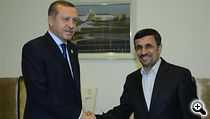Turkey’s multi-billion-dollar gold sales to neighboring Iran could put the country on a collision course with its close ally, the United States, when high-ranking diplomats from the two countries hold talks in Washington.

Turkish Foreign Ministry Undersecretary Feridun Sinirlioğlu was scheduled to be in Washington from January 14-16 for discussions with State Department officials, including US Deputy Secretary of State William Burns. The gold sales were expected to come up during the talks, which will cover a broad range of Middle East-related topics. But a senior Turkish official told EurasiaNet.org that Turkey itself did not intend to raise the gold-for-gas issue.
“We have no plans to talk about it, but the US can bring it up,” said the source, who requested anonymity.
Through the first six months of 2012 Turkey’s gold trade with Iran totaled $6.5 billion, according to various news reports. For the entire year, the value of the gold shipped to Iran from Turkey is estimated at $11-12 billion, according to industry analysts and media accounts. Worldwide in 2010-11, Turkey had total exports of gold and precious gems worth about $4 billion.
The massive 2012 gold transfers are part of the Turkish payment for its gas imports from Iran, which meets 18 percent of Turkey’s annual demand of 50 billion cubic meters. The arrangement makes Iran the country’s second-largest supplier after Russia.
The sales, made through Switzerland and Abu Dhabi, have “become probably the most important source of income to Iran and . . . have allowed Iran to use gold as its main currency for securing necessities from abroad,” commented consultant Attila Yesilada of the Istanbul-based research consultancy Global Source Partners.
The flow of gas and gold now must maneuver around a US ban introduced this year on the sale of precious metals to Iran; the latest tactic in Washington’s effort to curtail Iran’s nuclear research efforts. Authors of the legislation named Turkey as one of its prime targets. Most Turkish financial institutions have offices in the United States, and thus could be liable for prosecution; a powerful incentive for Turkish compliance with the ban.
So far, Ankara has striven to show that it is not cowed by the ban. “We are only bound by sanctions passed by the UN Security Council and not by unilateral sanctions by individual countries,” said Turkish Foreign Ministry spokesperson Selcuk Unal in December.
Nonetheless, for all the tough words, Ankara previously has avoided confrontations with Washington over Iran, and “abided by all US legal measures against Tehran,” commented Inan Demir, chief economist at the privately owned Finansbank.
In a possible gesture to Washington earlier in January, Turkish customs officials grounded a Turkish-owned cargo plane, en route from the United Arab Emirates to Iran, after it made an emergency landing at Istanbul’s Sabiha Gökçen airport. The Turkish media widely reported the plane was carrying 1.5 tons of gold and had arrived from an African country.
The dispute over gold transfers is putting Ankara in a tight spot. Iranian gas is crucial to Ankara’s efforts to diversify its gas imports. The Turkish government is reluctant to increase its already heavy dependency on Russia for energy.
One solution increasingly being touted is the age-old practice of bartering, a measure already used by India to buy oil from Iran. A Turkish diplomatic source acknowledged that a barter deal could be brokered. “Turkish government agencies will be looking into this. We need to support economic growth with all countries, including with Iran, in this challenging world economic climate,” the official said.
A business network already exists in Turkey to facilitate such trades. Over 2,000 Iranian companies now operate in Turkey, most of which have been set up in the past few years, according to the government.
Bartering has the added bonus for Turkey that, unlike gold, which it has to import, any products it barters would be locally produced. The question, though, remains of whether Turkey has a sufficient amount of tradable and desirable goods to cover their Iranian energy bill.
“The problem now is neither Ankara nor Washington knows what Iran is using its gold for; it might be buying necessities — medicine, food. Or maybe [it is] financing [Syrian President Bashar] Assad’s forces or Hezbollah in Lebanon in … some terror acts,” speculated Global Source Partners’ Yesilada. “With barter, that is completely removed from the equation because you can’t buy arms with jam.”
There remain other alternatives for Turkey, liquefied gas from Arab Gulf States, but that is more expensive. A cheaper option is from the neighboring semi-autonomous Iraqi Kurdish region, but any new pipeline would take at least a year to build. Deep divisions between the Iraqi Kurds and the central government in Baghdad over the distribution of the country’s energy riches, further complicates the issue. For now it seems Ankara will be looking for new creative ways of paying for its Iranian gas.
Editor’s note:
Dorian Jones is a freelance reporter based in Istanbul.
via Turkey: What is Iran Doing with Turkish Gold? | EurasiaNet.org.